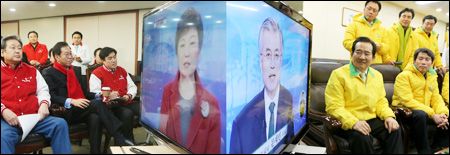
Conservative ruling party contender Park Geun-hye and opposition rival Moon Jae-in will explain how their policies would help the business community until their faces turn red. But to the billionaire owners of chaebol, the mighty family-owned conglomerates that pull Korea’s export-dependent economy, only one of the presidential candidates sounds convincing.
Park, daughter of late dictator Park Chung-hee and representing the Saenuri Party’s hopes of retaining the country’s most powerful office, seems the easy and instinctive choice of business leaders.
They are concerned that Moon of the Democratic United Party (DUP) would be more assertive in reforming the chaebol, which are frequently accused of monopolistic behavior and unlawful transfers of wealth to their founding families. He also vows to strengthen cross-ownership restrictions on industrial and financial companies, not exactly music to the ears of groups like Samsung, Hyundai Motor and Lotte.
There was little differentiation at the start of the year between Park and Moon, who squared off over jobs and the economy in the second presidential debate Monday, as they both adopted the “democratization of economy’’ slogan and speechified about preventing big businesses from killing parity in market competition.
“Our pace in economic growth dropped dramatically. Our country’s potential growth rate dropped from over 4 percent to 2 percent. Some of this is related to worsening global conditions, but some of the blame has to go with the unfairness in market competition,’’ Moon said in Monday’s presidential debate.
“No Korean company established after the 1980s could rise as a top-10 business group. None of them are even in the top-30. Chaebol took advantage of all the privileges and prevented small- and medium-sized companies from growing.’’
“My idea of democratizing the economy will restore a fair and transparent market economy where anyone who works hard will be rightfully compensated, and restore the faith that dreams and goals can be achieved,’’ Park countered.
But with worsening global conditions resulting in a sharp pullback in economic growth, Park has backtracked from her previous position and has been toning down her previous promises on chaebol reform, such as restricting “circular’’ equity investment. She agrees to the need for stronger restrictions against the same corporate owners controlling industrial and financial companies but her plans have been unspecific.
“Our economy will face harsh conditions in the coming year and we need a president who understands the economy well, sets priorities clearly and is willing to get the job done. Not that we are particularly enthusiastic about either of the leading candidates but we have to say that Park represents the brighter outlook,’’ said one banking CEO who didn’t want to be named.
Moon has been putting his foot down on stemming the chaebol practice of circular equity investment, which allows them to weave a complex web of corporate ownership that accelerates the transfer of wealth and management power to their founding families.
Exhibit A is the Samsung Group, the undisputed kingpin of Korea Inc. Samsung Electronics Chairman Lee Kun-hee, the second-generation owner of the group, controls 20.76 percent of Samsung Life, while Samsung Everland, the fun park manager that doubles as the essential holding company of the group, is the second-largest shareholder with a 19.34 percent stake.
The majority shareholder of Samsung Everland is Lee’s son, Jae-yong, who earlier this week was promoted to vice chairman of Samsung Electronics, making him the second-most powerful man in the Samsung totem pole.
The elder Lee owns just 3.38 percent of crown jewel firm Samsung Electronics, while his son controls less than 0.6 percent and his wife Hong Ra-hee just over 0.7 percent. But the majority shareholder of the company happens to be Samsung Life with a 7.47 percent share.
To summarize the dizzying numbers into a single sentence, Lee is maintaining dominant control over his corporate empire by leveraging the assets of Samsung Life’s insurance customers.
Moon unpacking at Cheong Wa Dae has the possibility to alter Samsung’s management structure dramatically, presuming that the DUP candidate would be able to put the money where his mouth is.
Within a three-year “grace period,’’ which Moon’s camp is promising now, Samsung would have to sell an 18.5 percent share of Samsung Everland currently divided between Samsung SDI, Samsung Electro-Mechanics, Samsung Fire and Marine Insurance, Samsung Card and Samsung Corp. It would also need to find takers for the 7.4 percent share Samsung SDI holds in Samsung Corp.
Depending on who would be buying these shares, there is a possibility that the Lee family finds its grip over its business group loosened. Strengthened restrictions against circular equity investment could also bother Hyundai Motor Group Chairman Chung Mong-koo, whose family combines to control only 7 percent of profitable parts maker Hyundai Mobis.
While Park also talks about stemming circular equity investment, she intends to curb only “new’’ attempts while letting the current ones remain. So Lee wouldn’t be losing any sleep should Park prevail on polling day.
A strict employment of a cross-ownership ban on industrial and financial companies could hit the Lee family even harder. This would force Samsung Life and Samsung Fire and Marine Insurance to sell their combined 8.8 percent ownership in Samsung Electronics or give up their voting rights on the shares.
When excluding the shares held through financial firms and special-interest shareholders, the Lee family is left with only a 17.6 percent share in Samsung Electronics. Samsung’s financial units also own more than 12.1 percent of Hotel Shilla and 9.6 percent of private security firm S-1.
It would require a Herculean effort for Lee to maintain his presence over Samsung under the new conditions. A conversion to a holding company structure wouldn’t be easy: The law requires a holding company to hold at least 20 percent of a listed subsidiary and 40 percent of an unlisted one. And a 20 percent ownership in Samsung Electronics would cost nearly 40 trillion won.
Hyundai Heavy Industries, Hanwha, Lotte and Hanjin are some of the other companies that are sweating over the talks to strengthen cross-ownership restrictions on industrial and financial firms. Moon talks about reviving the ceiling on corporate equity investment to restrict how much business groups can invest in its own subsidiaries, which alarms corporations like SK Group.
“The current talks about democratizing the economy could be summarized as clamping down on inter-affiliate businesses, improving corporate governance and strengthening the cross-ownership restrictions on industrial firms and finance. Of these scenarios, renewing cross-ownership rules seems to be the likeliest to happen. This may force business groups like Samsung, Hyundai Heavy Industries, Lotte, Hanwha and Hanjin to establish holding companies to act as middlemen or sell some of their shares in their financial subsidiaries,’’ said KB Investment and Securities analyst Lee Sang-won.
“LG, CJ, Doosan, GS, LS and SK have already converted to holding company structures and are continuing to clean up their corporate governance structures, so they will be comparatively less affected by whoever becomes the new president. <The Korea Times/Kim Tong-hyung>




